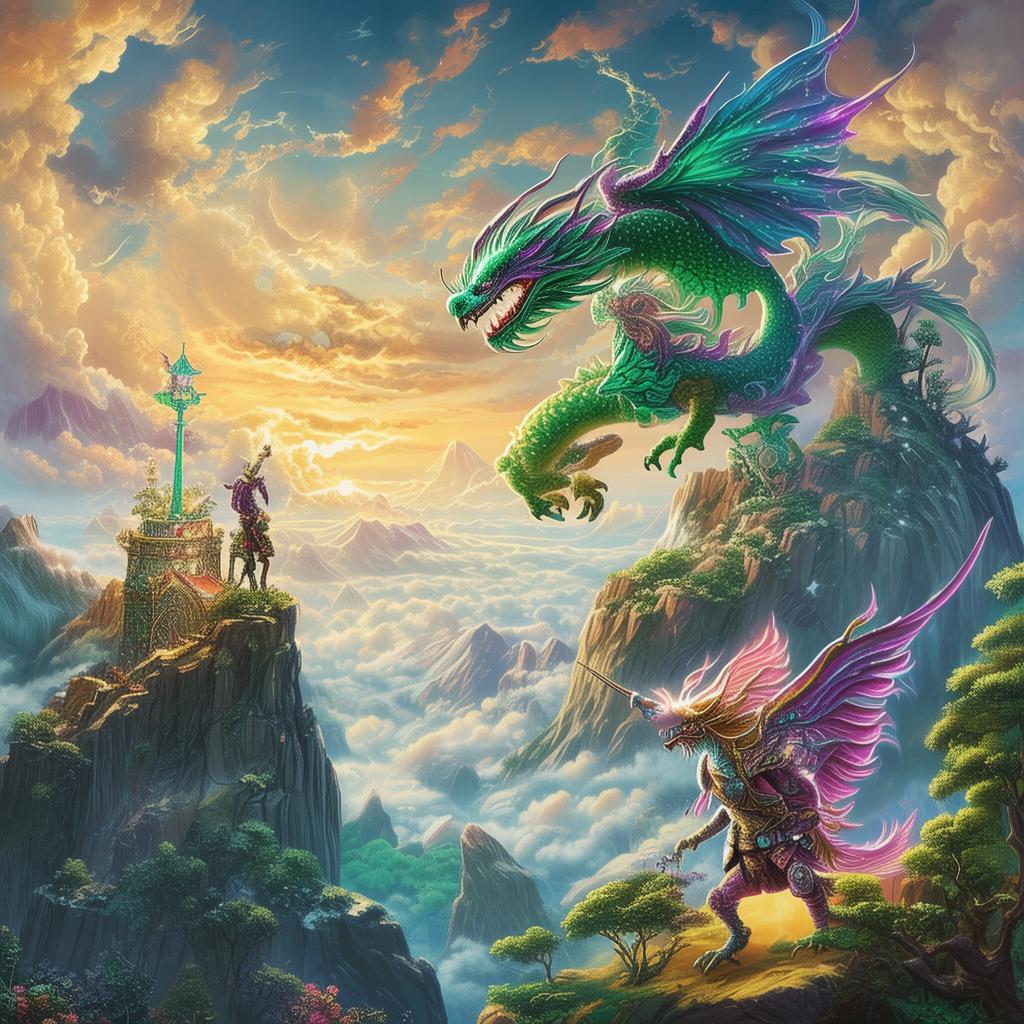The Labyrinth of Aether: Apollo's Atomic Reckoning
The ancient city of Delphi stood at the heart of the world, its sacred Temple of Apollo shrouded in the mystique of prophecy and divination. Within its walls, a labyrinth of Aether twisted and turned, a place where the boundaries between the divine and the mortal realms blurred. Apollo, the god of the sun and the Oracle of Delphi, had always been a guardian of this sacred space, but now, a tempest of cosmic proportions threatened to unravel the very fabric of reality.
In the days before the dawn, a portentous whisper of a riddle had begun to stir the air. "Who am I, that I can move the stars and shake the earth?" It was a question that echoed through the labyrinth, a challenge to Apollo's wisdom and his divine powers.
The Oracle, the voice of Apollo, had spoken, and the people of Delphi had gathered to seek guidance. But the riddle was not meant for them—it was for Apollo himself. The labyrinth, with its enigmatic paths and shifting walls, was a puzzle that only he could solve. It was a reckoning, an atomic reckoning, that would determine the fate of the cosmos.
Apollo, a god of light and reason, found himself face to face with a new kind of enemy. The labyrinth was alive, its walls shifting with the very atoms that composed them. The challenge was not just a test of his intellect, but of his very essence as a deity. The labyrinth was a reflection of the universe itself, and within its confines, the threads of time and space intertwined in ways that could alter the course of the cosmos.
As Apollo navigated the labyrinth, he encountered visions of the past, present, and future. He saw the birth of the universe, the creation of the gods, and the rise and fall of civilizations. Each vision was a piece of the puzzle, a clue to the identity of the enigmatic figure that moved the stars and shook the earth.

In one vision, Apollo beheld a mortal woman, her eyes filled with the wisdom of ages. She was the first human to enter the labyrinth, and her journey had shaped the very essence of reality. In another vision, he saw the cosmos in turmoil, as a dark force threatened to consume the light of the universe.
The labyrinth was a labyrinth of the mind, a place where the boundaries between the material and the immaterial were blurred. Apollo's journey required not just physical movement, but also an inner transformation. He had to confront the shadow within himself, the part that was both divine and mortal.
As Apollo delved deeper into the labyrinth, he encountered challenges that tested his resolve. He had to confront his own mortality, the fear of losing his divinity, and the responsibility that came with his powers. The labyrinth was a crucible, a place where he could either become a mere mortal or transcend his limitations and embrace his true nature.
In the heart of the labyrinth, Apollo faced the ultimate challenge: a confrontation with the enigmatic figure who moved the stars and shook the earth. It was none other than himself, a reflection of his dual nature as a god and a mortal. The figure spoke, revealing that the atomic reckoning was a test of his ability to reconcile the two halves of his being.
The reckoning came down to a choice. Apollo could abandon his divinity and become a mortal, embracing the limitations and challenges that came with it. Or he could embrace his divine nature and face the cosmic forces that threatened to consume the light of the universe.
With a heart filled with both fear and determination, Apollo chose the latter. He accepted his dual nature, recognizing that the light and the dark, the divine and the mortal, were not opposing forces but complementary aspects of the same whole. In doing so, he not only saved the cosmos but also found a deeper understanding of his own identity.
The labyrinth of Aether, with its shifting walls and atomic riddles, had revealed the truth of Apollo's existence. He was both the bringer of light and the shaker of the earth, a god who could move the stars and shake the cosmos itself.
As Apollo emerged from the labyrinth, the world around him seemed to shimmer with a new understanding. The riddle had been solved, and with it, the cosmic forces that threatened to consume the light of the universe were held at bay. Apollo, the Oracle of Delphi, had become the guardian of both the divine and the mortal realms, a god who could move the stars and shake the earth in harmony.
And so, the labyrinth of Aether remained a sacred place, a testament to the power of self-discovery and the eternal dance between the divine and the mortal. Apollo's journey through the labyrinth had not only saved the cosmos but had also shown the way for all beings to reconcile their innermost truths.
✨ Original Statement ✨
All articles published on this website (including but not limited to text, images, videos, and other content) are original or authorized for reposting and are protected by relevant laws. Without the explicit written permission of this website, no individual or organization may copy, modify, repost, or use the content for commercial purposes.
If you need to quote or cooperate, please contact this site for authorization. We reserve the right to pursue legal responsibility for any unauthorized use.
Hereby declared.









